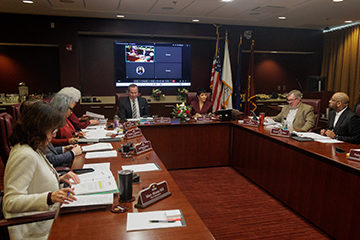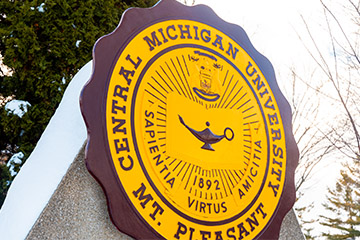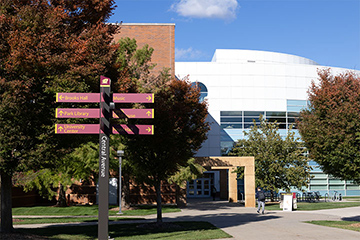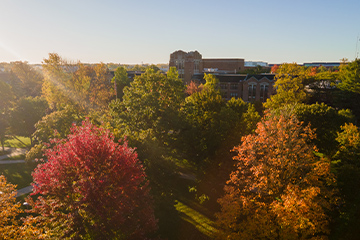CMU trustees discuss university priorities and initiatives
New residential complex design highlights approved capital projects
The Central Michigan University Board of Trustees today was updated on successes of the past academic year and then approved major strategies and priorities for the current fiscal year.
President Bob Davies highlighted several achievements in his annual report to the board, including:
- Launch of the Mentor Collective, a program where current students register to become mentors to new students. To date, 600 current students have welcomed and supported new students through thousands of mentoring interactions.
- A 20% increase in overall scholarly activity over the previous year, including more articles published in high-caliber journals, book chapters and professional conference presentations.
- Positive community impact through engagement, including partnerships with health departments and other health care systems to respond to the pandemic, and collaborations to better educate future health care professionals.
- Completion of the first phase of the Strategic Envisioning Process, with all pathway groups having submitted near-term goals and recommendations for action.
Davies addressed this year's priorities, led by efforts to increase enrollment. Along with investing in enhanced technology and launching CMU's new website, priorities include reimagining Global Campus, strengthening relationships internally and externally, and increased commitment to marketing and branding, as well. CMU also will continue its focus on increasing diversity, equity and inclusion universitywide.
Another priority, as outlined by Davies, is to hire CMU's next provost. CMU has selected search firm Greenwood/Asher & Associates to assist in the national search, and outreach to select the search committee is underway. The campus community will be invited to assist in development of the position profile for a provost to follow Mary C. Schutten, who announced her intention to step down effective Dec. 30.
Upgrading campus housing
Trustees also approved several capital projects, many focused on enhancing residential living on campus.
One of the approved projects authorizes the design of a proposed campus residential community project, Washington Commons, which will bring contemporary, independent-style living to campus. The new complex — to be located along Washington Street between the Towers and Preston Street — would replace Northwest Apartments and Kewadin Village. Both complexes are over 50 years old and regularly require significant maintenance.
"The Washington Commons project will reinvigorate Washington Street and the core of campus," said Nick Long, vice president for finance and administrative services. "This is an opportunity for students to enjoy independent-style living while still being integrated into campus life."
In addition, trustees approved $8.1 million for interior renovation of Cobb and Wheeler Halls, which will complete an update of the original Towers Complex. Carey Hall was updated in 2019; work on Troutman is underway and scheduled to be completed in April 2022. Construction on Cobb and Wheeler Halls will take place in 2022 and 2023.
Other approved capital projects include upgrades to floor-level, movable seating in McGuirk Arena, lighting in Bush Theatre, and turf on the baseball and softball fields.
In other business, Plante Moran, the university's external audit firm, presented the trustees with a clean, unmodified audit opinion — with the highest level of assurance. Trustees also approved nearly 750 students for graduation this past summer as well as emeritus rank for nine faculty and staff.
The board also received a report showing external grant funding of faculty and student research increased to nearly $17 million in the fiscal year that ended June 30, up from $14.2 million the previous year.
President's report
In his opening report to the board, Davies once again recognized the university's response to the COVID-19 pandemic and noted the university is entering a new phase.
"We are moving out of survival mode and back into engagement mode. We are reestablishing the robust and engaging life on campus that makes CMU such a unique place to learn, work and live," Davies said.
Along with highlighting several board agenda and discussion items, Davies also recognized:
- Edwin Williamson, a graduate student studying creative writing in the Department of English Language and Literature, for being CMU's first student to be honored by the Academy of American Poets.
- Students from CMU's Central Sustainability group and the Saginaw Chippewa Tribal College for establishing the Three Sisters Ethnobotanical Garden to shine a light on Indigenous culture and traditions.
- The CMU College of Medicine's newest class of 104 future physicians, who were chosen from more than 6,500 applicants.
- A new nursing partnership with Mid Michigan College that allows students to complete their associate degree in nursing at Mid and their bachelor's degree at CMU.
- A four-year, $5 million grant from the U.S. Department of Energy to support physics faculty research in materials science.
- Graduates recognized with annual Alumni Awards.
- CMU students, faculty and alumni from the Fashion Merchandising and Design program who are participating for the first time in the Detroit Month of Design.




